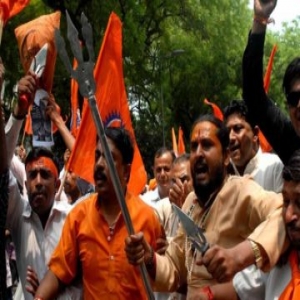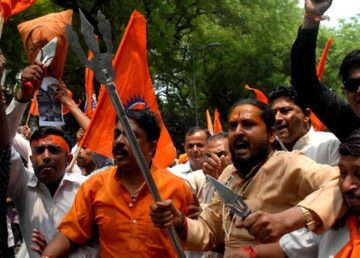

Religion is considered a way of life associated with something holy and absolute. It is concretely a belief and worship of superhuman powers from infinity. Every religion forms a well-thought-out belief system and principles to follow in the path of the divine. Religion plays a vital role in one's life alongside good health and well-being since, in reality and essence, it is a guide to mutual respect and co-living. In other words, it normatively specifies the morality of one's behaviour and actions, which is particularly tough to digest in the current socio-political scenario.
Pope Francis said during his recent visit to East Asia that "All religions are paths to God." A close examination of the daily happenings raises the question, does all religion lead to God? The violence in the name of religion is a cross too heavy to bear for the common man. If religion really leads to God, then there would not be any enmity and ferocity as we see in different parts of the country. Religious intolerance and violence are increasing day by day in our republic, as are the number of devotees and worship places. In fact, today, religion is more than just a pathway to solace and peace; it is a matter of struggle and destruction to a vast majority. In such instances, how can we say religion leads to God?
The words of Karl Marx still reverberate - "Religion is the sigh of the oppressed creature, the heart of a heartless world, and the soul of soulless conditions, it is the opium of the people." In fact, he believes that religion is a matter of apprehension for the less privileged and downtrodden in a society where humanity is under threat, etc. For him, it is also opium to the common man, which affects the cognisance and is easily moved for the personal motives and benefits of certain privileged persons or groups. Moreover, it makes someone 'happy' and 'content' even in pitiful situations. The increasing mob lynching, vandalism, etc, prevailing in our society proves his claim.
The recent Tirupati Balaji prasadam controversy shocked the true devotees and hurt the pious worshippers' sentiments. The true followers on the path of love and justice are the real victims of the fight among the 'leaders' for money, power, and property. These occurrences prove the inability of religion or the irresponsibility of religious heads towards their followers.
Here, the query arises: does religion really lead to God? In the present socio-political-religious scenario of the nation, it is evident that 'self-proclaimed gods' lead religions. We fail to realise that religion is a face mask for power, position and money for these so-called divine persons and the political figures who claim to be their custodians. The irony is that if religions lead to God, then why does it require someone's help to protect it? In other words, do deities need man's help to guard themselves? The 'divine characters' and politically motivated persons who pose as guardians of one's faith give the impression of inmates running the asylum when they instigate the common man at their whims and fancies. Consequentially, religious fanaticism emerges, and hatred and violence are spread against other religions.
The escalating mob lynching and destruction of worship places of a different religion are the outcome of these fragmented elements perpetrated with a clear agenda of political and religious gain. Every religion teaches acceptance and reverence, but unfortunately, we live in a period of religious prejudice due to the said reasons. Unless the common man is led to the true light of religion, violence and manipulation, even in the holy and salvific 'prasadam' of deities, will occur again and again.
The question is, who will bell the cat? The only answer is the 'common man', but how? It can be through thinking of oneself and one's purpose in this universe. If everyone realises the serenity of living together, as advocated by every religion, no one can be drugged with odium and antagonism. One must know the real spirit of one's faith and must live it instead of just superficially following it. People must understand the core values envisaged by every religion and must dare to take steps to live it, unlike the blind allegiance of the supposed defenders of religions. More than the idea of God, the experience of God must lead one to his religious ex
People begging for alms in front of places of worship are ubiquitous. Most pious souls give a pittance to them and offer gold, silver, and notable sum to the deity inside. Imagine the colossal wealth gathered in worship places. Does God, who is the owner of the universe (as considered), require the amassed wealth? If such treasures, unutilised for centuries, were made use of the well-being of the deprived ones, most of the citizens would have had shelter and food.
Innumerable people in our country live on footpaths, under flyovers and in slums, deprived of human dignity. God is omnipotent and omniscient according to every religion and does not await our offerings to sustain themselves; it is these numberless who require a helping hand. Therefore, the offertory boxes in the houses of worship must be shifted to where the needy remains - slums and footpaths - to enable our fellow citizens to have a respectful life as God wants. Service-minded people may voluntarily supervise and monitor its use effectively. Of course, I acknowledge and accept the good works done by several religious persons and worship places, yet there are demands for reformation aplenty. Persons and holy places providing free food and shelter to the needy are the rays of hope of the society.
Religion professes that human beings are the children of the almighty there, and everybody has the right to live and practice the belief in freedom. The signs of the time must motivate the citizens to live life peacefully in unity and diversity. Therefore, the nation requires a new religion to proclaim the core values for respectful living. Let the people embark on a new religion, "Indiaism," and proclaim it to the larger world, heralding a much-sought societal change. The magnificent Constitution must shine as the holy book of this religion to eradicate the existing fanaticism. The citizens must strive to get down to brass tacks and fundamental facets of the Constitution to remedy the growing religious extremism and political antagonism.
The time and situation mandate that we be made of sterner stuff to become the big cheese for change. It is pretty easy to be hopping mad or lament over the plight and point fingers. What is required today is to arise as a sincere patriot and analyse and admit the obligation to stand against perpetrators of abhorrent deeds in the name of religion and deities. We must tear down the masks that hide lust for power. Let the religion lead to God, not the 'gods' lead religions.